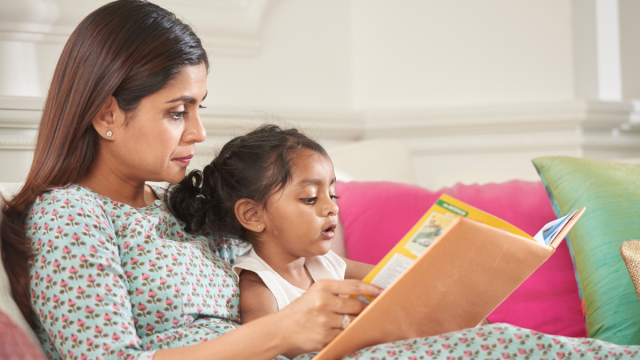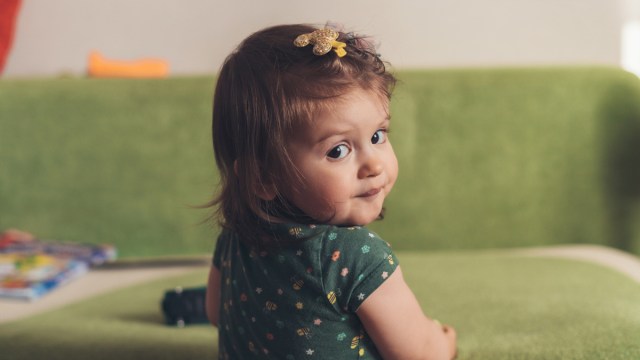Between 18 and 36 months, kids go through a period of developmental growth that’s nothing short of astonishing. Not only does the average toddler learn to walk, run, climb, jump, talk, and feed themselves, but they also begin to identify, express, and regulate new emotions. “Toddlerhood is a time of massive development and change,” says Dr. Whitney Casares, a pediatrician, author of Doing It All, and Gerber pediatric consultant. It’s also a time when these tiny people get up to some pretty weird stuff. Whether they’re stripping naked in the middle of the grocery store, chugging their bathwater, or demanding you read them the exact same book every night for six months straight, there’s never a dull moment. If you’re a new parent, some of your kid’s offbeat activities can feel especially confusing or even worrisome, so we asked Dr. Casares to explain eight weird things that are normal toddler behavior and how to handle them.
1. Guzzling bathwater.
“Toddlers are notorious for exploring their environments, especially when those environments are warm and splashy,” says Casares. And if you’ve ever caught your toddler eating dirt or licking the couch, you know that they’re particularly fond of exploring things with their mouths. Little kids don’t realize germs or harmful chemicals may be lurking in their bathwater, but you do. A small amount won’t hurt them, but since you’re keeping a close eye on them in the bath anyway, you can decide when they’ve had their fill of murky pee water. Once they’ve hit their limit, take away any toys that act like a cup and explain that the water is for cleaning, not for drinking. Do your best to distract them when they try to sneak a sip or 12.
2. Only wanting one parent, period.

It can hurt, being rejected by your toddler, even though they’re oblivious to your pain. Kids often develop a preference for one parent over the other depending on their developmental stage, how much time they spend with each parent, or different parenting styles. “Sometimes, though, a child might just be going through a phase that has nothing to do with the way you parent,” says Casares, so it’s important not to take it personally. “Focus on spending special time with your child, uninterrupted moments where you’re focused solely on building a connection, and know that your investment will pay off in the long run.”
3. Sticking anything and everything up their nose.
“Putting fingers or objects up their own noses, pulling on their ears, twirling their own hair—this is all part of the exploration and discovery process for young learners,” says Casares. To a toddler, their body is a playground, and exploring all the nooks and crannies can lead to things like pom poms or a big sibling’s LEGO getting stuck places. When this happens, reiterate that the nose is not a hiding spot and redirect their attention to something else. When it’s their finger they’re shoving deep inside their nostrils, explain that this is something they can do privately with a tissue but we’d rather not be their audience.
Related: 11 Things Parents Don’t Need to Stress About (According to Doctors)
4. Banging their heads on things.
Even though it’s normal, this is one of the weird toddler behaviors that is startling the first time you see it. Toddler head banging often happens during times of dysregulation, like tantrums or anxiety. As adults with developed prefrontal cortexes, we’re able to make decisions using logic and reason, also known as executive functioning, says Casares. But our little ones? Not so much. “When toddlers are faced with something that triggers them, they become their most basic selves. They are no longer in control; they are operating fully on emotion,” she explains. In such an emotional state, banging their heads repeatedly against the nearest hard surface can act as an outlet for big feelings or help them find some calm. In fact, a 2022 study found that 42% of toddlers bang their heads during tantrums.
Overtiredness is another catalyst because the rhythmic thumping and vibrations, though confusing to adults, can be soothing to a toddler. It can look and sound a bit scary, but rest assured, your toddler won’t concuss themselves and will generally stop before it becomes painful (this can sometimes take 10 or 15 minutes, though). Stay calm and try to redirect them to another soothing behavior rather than showing your fear with a big reaction that tells them this is a good way to get attention (they will remember). If you still feel like something’s not right, speak with your pediatrician.
5. So. much. nudity. (And touching themselves.)

Your toddler may go through a naked streak and will definitely touch themselves. Everywhere. Anywhere. And if they have a blissed-out look in the bubble bath you’d better believe there’s a flurry of activity below the surface. But you can take comfort in the fact that this is totally normal and all that toddler nudity is just a phase. “Never shame or blame, but it’s good to teach our kids to be appropriate,” explains Casares. “Keep it clear, short, and simple: We keep our clothes on in public.” When it comes to touching their private areas, again, don’t overcomplicate it. “Toddlers are exploring their environment and their bodies are pretty fun, but they can definitely understand an action being OK versus not being OK,” says Casares. “Talk about what’s appropriate at home and what’s not, do not go into a long diatribe about why.”
6. Making a run for it.
If your kid has ever darted away in a parking lot and your heart has lept into your throat, you’re all too familiar with this one. It’s particularly serious because it can put your toddler in danger. But remember, they are developing their ability to understand the difference between right and wrong, so it’s best to give them some credit and plan ahead. “Let them know your expectations before you enter the situation,” suggests Casares. “‘We’re going for a walk down the street, but you will not run into the street. We wait until the walking person says it’s safe.’” Setting them up for success and encouraging them when they do listen will help you all feel safe.
Related: 10 Totally Typical (But Weird) Things That Babies Do
7. Physically fighting friends and family.
“Parents are constantly teaching our kids the difference between what is acceptable behavior and what is not,” says Casares. “We need to teach our kids that all emotions are acceptable, but not all behaviors.” It’s OK to feel mad because you got the green dinosaur toy instead of the blue one; it’s not OK to hit someone, pull their hair, or bite them because you feel mad. This is a lesson that takes time and can feel super embarrassing for parents. But no, your toddler isn’t disturbed—it’s just a developmental phase. If the behavior seems particularly worrisome, speak with your pediatrician.
8. Watching or reading or listening to the same thing over and over and over…

Like so many of us, toddlers find comfort in routine. Sometimes that means sleeping with a certain stuffie (hot tip: as soon as you notice your baby bond with a stuffie, buy a backup or three) or watching the same 2-minute video until it’s permanently worn into your brain grooves. Toddlers find comfort in the safety of knowing what’s next, but research also shows that repetition helps toddlers learn. So when you read Goodnight Moon for the 487th time, remind yourself that you’re also encouraging a love of language.











